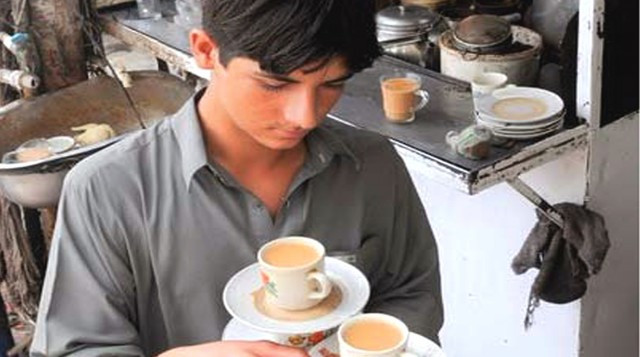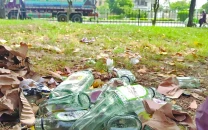Empty teacups making most noise

Empty teacups making most noise
Chaikhanas have existed around the city for decades, serving qehwa or doothpatti with parathas for a sundry of people, ranging from the labourer looking for a short break between work-shifts to students looking for a shot of caffeine to wake them up.
Pathan teashops can be found in almost every street across the city. The owners, however, have started shutting down their businesses in light of the recent spate of targeted killings in Karachi.
“We are not safe here any more,” said Agha Jan, who runs a teashop in North Nazimabad and feels that the chaikhanas are the first to be attacked during riots and target killings.
During the last year, around 23 people were killed and more than 53 people were injured while sitting at these shops, according to the central police office.
“Everyone in the neighbourhood treats us well. But whenever the situation is tense across the city, we are forced to close our shops and leave the area,” Jan told The Express Tribune while conducting business as usual at his shop that serves chai, parathas and omelettes.
“We now receive letters from unknown people, threatening us to leave the area,” he added.
Most teashops are situated in small areas, where approximately 15 people can be accommodated at one time. Around 39 such teashops were attacked within the past year, 13 of which were completely destroyed.
Sixty-year-old Hikmat khan lost his son in one such incident in Liaquatabad last January. He has now made his family move back to Quetta.
“My wife is still in shock and is not ready to accept the fact that her son was killed. I did not want to lose anyone else. So I decided to leave the city for the sake of my family’s security,” said Khan.
The situation across the country was pretty tense even in the late 80s and early 90s, but no one attacked restaurants or houses, said Jan, who was of the view that the situation has become bad because the people are no longer united.
“In those days, the people of the area would assure us that we will be protected, which is why we remained safe,” Khan reminisced, adding that the people no longer believed in “brotherhood” and wishing that the country could return to the 80s.
Around 57 chaikhanas have closed down within the last one month, claims Azmatullah Jan, who heads the meeting of teashop owners. He said that 27 teashops have been attacked in incidents of sectarian violence within the last three months, adding that the business of selling tea now holds neither security nor profit for them.
“Even when students fight amongst each other, they attack our shops,” Jan lamented while narrating a recent event in which his shop had been attacked during clashes between members of the All Pakistan Muttahida Students Organisation and Pukhtoon Students Federation.
Furthermore, teashop owners are not associated with the Khyber Pakhtoonkhwa-based Awami National Party, said Jan. Some of them are associated with the Pakhtoonkhwa Milli Awami Party-a Quetta based nationalist party that has almost no existence in Karachi.
Teashops have been attacked in Qasba, Baldia, Nazimabad and Liaquatabad, said Jan, who added that all Pathans may have to close their businesses if the situation was not controlled.
Police officials said, however, that the teashops were not exclusively targeted in riots or killings.
“Usually when riots take place, people start burning everything,” said a police official, adding that at times, the person whom the attackers wish to target sits at these teashops, because of which the shop, too, becomes a target.
Meanwhile, some teashop owners also claimed that they were forced to pay extortion money to the police in some areas of the city. They added that this affected their profit margins and was another reason why they had to think twice about staying in business.
Abdul Hai, a member of the Human Rights Commission of Pakistan, also blamed the police for forcing extortion money out of shopkeepers. Police officials, however, rebuffed these claims.
Published in The Express Tribune, July 2nd, 2010.



















COMMENTS
Comments are moderated and generally will be posted if they are on-topic and not abusive.
For more information, please see our Comments FAQ